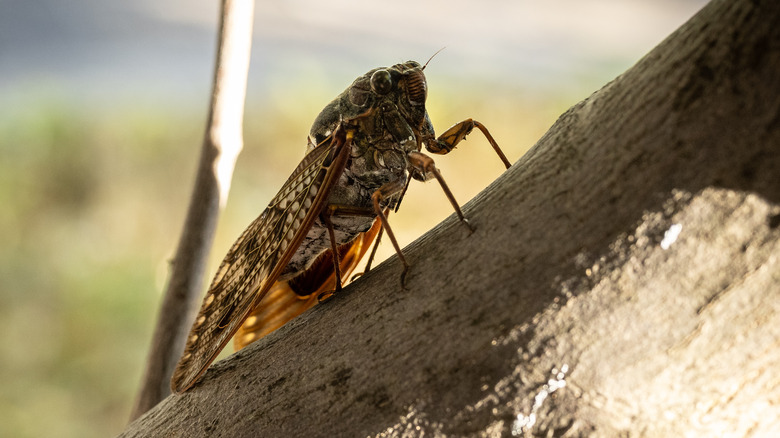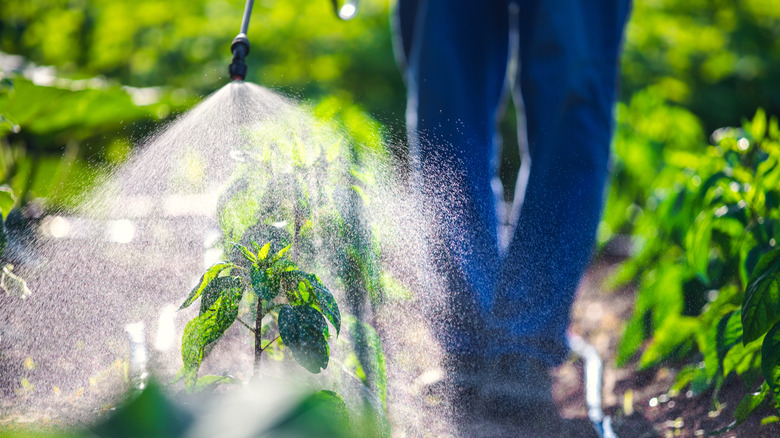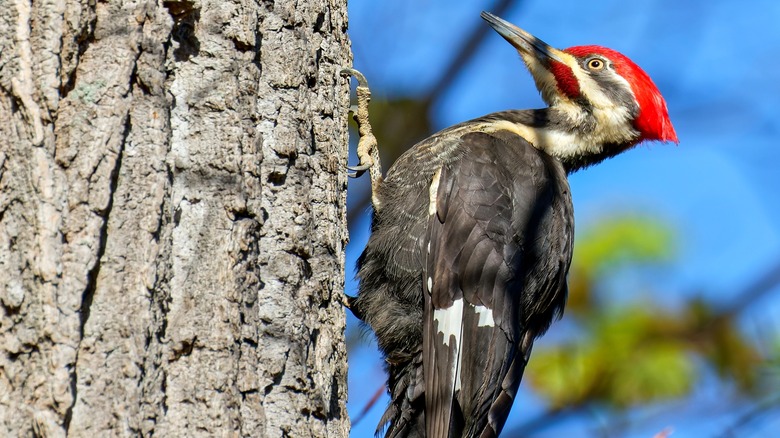4 Easy Ways To Keep Cicadas Out Of Your Yard
Does the sound of crickets in the middle of the night bother you? A worse threat to your good night's sleep is the cicada, a 2-½-inch to 3-inch insect that typically has large, transparent wings and is best known for the loud songs or mating calls it creates, according to Solutions Pest & Lawn. There are several species in the U.S. though they typically have similar features, including a metallic black or green body and black to bright red eyes.
Typically, you'll find them living in trees, as that's a primary food source for them, but you'll have to look closely since they blend in so well. Once you spot these pests, you'll want to take whatever steps you can to minimize their invasion of your property, as they can be quite loud, and once the adults die (within a few days of emerging,) you'll have quite a mess to clean up. Acting quickly in eradicating them will also help to reduce the risk of damage to trees and plants, too.
Use your garden hose
Many people don't want to hurt the cicadas, but they do want to encourage them to find a place to nest and mate in the neighbor's yard instead of their own. One simple way to do this is to use a garden hose. Attach a sprayer to the hose and simply spray water on the cicadas to push them away from your home and yard, according to GreenMatters. A jet of water like this doesn't have to be a strong stream, just enough to encourage the insects to go elsewhere instead of your trees.
Once you've done this, create some barriers using insect netting, especially around your fruiting trees, bushes, and other plants that are particularly vulnerable and those that are just establishing. Be sure to choose nets designed for cicada-like insects to ensure they cannot get through the small holes, which should provide ample protection.
Use insecticides
There are various insecticides that may work on cicadas, though it's important to choose those designed for the maximum coverage of pests. Read the labels to make sure cicadas are one of the insects the product treats, and then be sure to carefully follow the directions for application. When possible, select a product that has a long residual effect for the best results, according to Solutions Pest & Lawns. These products can remain present long term, even up to 90 days, helping to ensure the cicadas don't come back.
For ample protection for your home, they recommend creating a perimeter of 3 feet up and 3 feet out from the home, including treating areas like doors and window frames. This helps to discourage the pests from getting to the home itself. Once you create that barrier around the home, target other high-risk areas in your yard the same way, including any flowering trees or plants you have.
Consider using essential oils
Not everyone wants to add chemicals to their yard to keep the bugs away as there can be some risk to children and pets. Essential oils can be another effective option, according to Bugwiz. If you add essential oils into a sprayer or spray bottle with water and then spray them directly onto the plants and trees attracting cicadas, the oils will work as a natural deterrent. Most of the time, this causes no damage to your plants and won't harm your pets or children either.
There are various essential oil options, and the goal here is to choose something with a strong scent. Consider peppermint oil or spearmint oil. You may also find some benefits with lavender or thyme. Apply this to any tree branches, flowering buds, or other vegetation the pests are likely to nibble on. Chances are good they will go elsewhere for their next meal.
Bring in the birds
One of the best ways to be more hands-off in getting rid of cicadas is to let Mother Nature do the work for you — with a bit of spurring on. Some birds love to feast on cicadas, which means one of the natural tools you have to get rid of them are the birds around your area, according to Bugwiz. Though these insects can be good at hiding in trees, making them harder for birds to spot, you can offer some help.
Work to attract birds to your home by using suet and bird food in high-risk areas, such as hanging in the trees or near your flowering plants. Woodpeckers are specifically attracted to these insects and may be brought in naturally with bird food. While other insects and predators for these insects exist, like rodents, praying mantis, and possums, you don't necessarily want to welcome all of these creatures into your backyard. Stick with birds for an easy-to-manage method.




